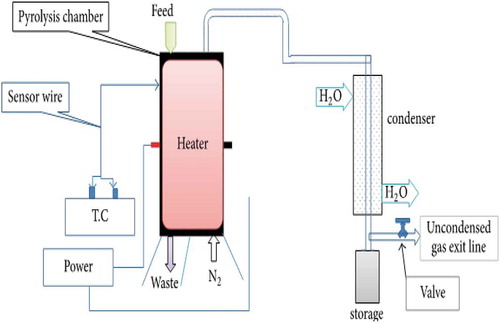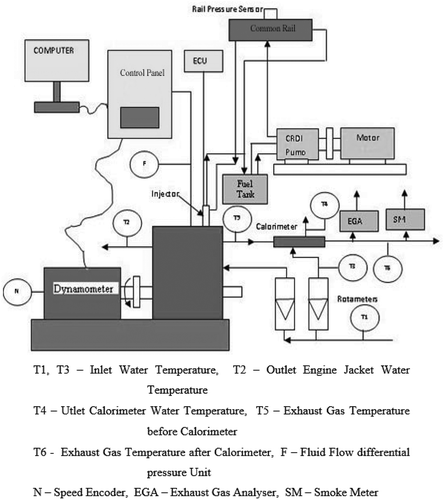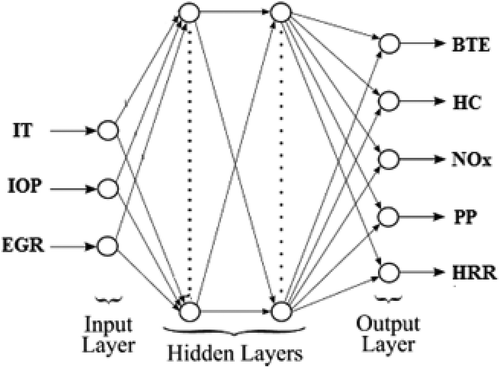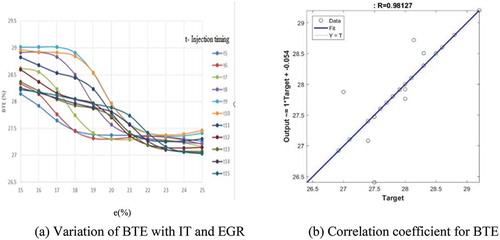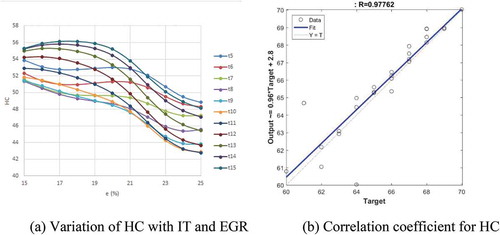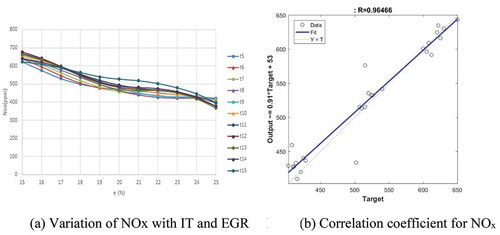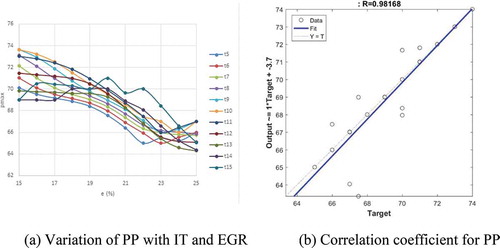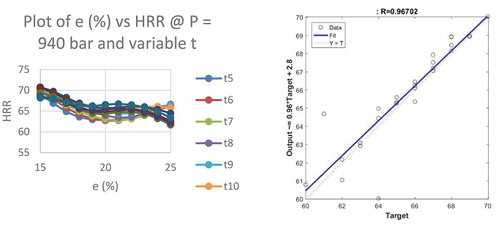ABSTRACT
Artificial neural network model was constructed to analyse and evaluate the engine performance. The experiments were conducted on a diesel engine with the blend of plastic pyrolysis oil with diesel and ethanol. Three input layer with two hidden layers and five output layers were used in artificial neural network modelling. The learning algorithm called feed-forward back-propagation was applied for the hidden layer. To train the neural network, 70% of the complete data from the experimentation was selected and 30% in predicting from the neural network. The model developed for prediction has excellent agreement as observed from the correlation coefficient (R) within the range of 0.964–0.9816. Statistical analysis shows that the ANN predicted and experimental results are in close agreement with each other. Overall, it could be concluded that it is a mean to predict the virtual sensing in studying the real time with established artificial neural network architecture. In addition, common rail direct injection engine operation could give complete freedom from diesel and thereby provides energy security and sustainable of a nation.
1. Introduction
For the past few decades, there is significant growth in the use of vehicles worldwide. At the same time, the pollution given out by these vehicles has raised the global warming issue. With the depletion of conventional fuel and an increase in the pollution level has led many researchers to work on alternative fuels that yield lower emissions without compromising in the power. The quality of air is deteriorating due to the emission especially nitrogen oxide (NOx) from the diesel engine powered with diesel, which is a key factor to be considered for research work as it affects human health. Some of the countries like Brazil and China have implanted heavy taxes on these vehicles keeping in mind the elimination of such vehicles. Even the Indian government in some of the cities has banned the vehicle that runs on diesel with 200 CC (National Green Tribunal). In order to use the diesel engine, alternative fuels are the promising sources of energy but fuels must yield lower emissions. The number of experimental work on diesel engine has been carried out under the influence of mixture formation and injection strategies (Theinnoi, Suksomponga, and Temwutthikuna Citation2017; Banapurmath et al. Citation2018). The main challenge for emission control can be done by earlier and after treatment control devices which are involved in converting NOx/particulate matter (PM) to comparative benign compounds [Johnson TV Citation2006]. Various methods to reduce the NOx emission from a diesel engine are EGR, variation in injection strategies, water injection and reducing ignition delay (ID). Among these EGR and injection strategies were proved to be effective methods currently being applied to reduce the NOx (Robert et al. Citation2002; S.V. Khandal et al. 2017a). In EGR, the fraction of exhaust gases is recirculated into the intake manifold which mixes up with air being inducted into the combustion chamber (Fang et al. Citation1999). It has also observed that with different injection strategies, the NOx was reduced when the engine operated with pyrolysis oil (Sudershan et al. Citation2017). Research studies (McGeehan Citation2005; Johnson Citation2008; Zhao Citation2010; Badami, Nuccio, and Trucco Citation1999; Suh et al. Citation2011) has establishes a clear evolution of pollution norms that challenged the design and development of diesel engine with modern technology. This paradigm shifts in the technologies of a diesel engine which satisfy the specified emission norms along with best fuel economy. Among the numerous latest technologies, common rail direct injection (CRDI) finds a renewed interest (Balusamy Citation2010; Shimazaki Citation2003). CRDI technology has proven to be low emission with reduced fuel operating consumption due to homogeneous mixture formation (Pickett Citation2004; Minato, Tanaka, and Nishimura Citation2005; Desantes et al. Citation2004; Pierpont et al. Citation1995; Payri Citation2006) than the conventional diesel engine but NOx emission was higher (Hountalas, Mavropoulos, and Binder Citation2008). However, when pyrolysis oil (PPO) blended with diesel and ethanol in the percentage improvement in the emission were observed without much compromising in its performance (Sudershan et al. Citation2019). EGR has been employed widely because of simple operation with higher efficiency along with cost-effectiveness (Maiboom Citation2008). One of the main drawbacks of experimental work is that it consumes more time in the analysis of the engine performance and it is expensive. To overcome such problem, modelling tools were developed as an alternative. One such technique is modelling with ANN. This technique was used to estimate the required output parameters by utilising the experimental data available. Hence, ANN model of physical phenomenon in complex systems without using mathematical relations could be advantageous in predicting the responses. Researchers used ANN in predications of engine performance and different thermal systems (Kalogirou Citation2000; Pacheco-Vega Citation2001; Betchtler Citation2001; Prieto Citation2001; Chouai, Laugeier, and Richon Citation2002; Sozen, Arcaklioglu, and Ozalp Citation2003; Ertunc and Hosoz Citation2006; Hosoz and Ertunc Citation2006). The application of the ANN model was applied to a diesel engine in predicting its performance and emission character. The performance and emissions of a diesel engine under the effect of injection pressure using ANN were reported (Canakci, Erdil, and Arcaklioglu Citation2006; Arcaklioglu Citation2004; Arcaklioglu and Celikten Citation2005). IT, IP and EGR are the important parameters in the performance analysis of the CRDI engine. The experimental work on CRDI engine fuelled with rapeseed oil (RSO) and its blends showed lower NOx emissions, where the fuel IT varied from 3° BTDC to 9° BTDC. The diesel equivalent levels of soot emission and 22% reduction in NOx emissions were reported at 30% RSO and IT of 3° BTDC and IP of 1200 bar (Labecki et al. Citation2012). When EGR of 20% was employed with retarded single injection of the fuel at 9° BTDC, NOx reduced further at the expense of higher smoke, HC and CO emissions and lower PP and HRR were also reported as compared to neat diesel operation. However, when IP increased beyond 800 bar, NOx emission was higher than the CI operation, but soot emission lowered (Labecki et al. Citation2012; Song et al. Citation2012). The SOME indicated faster ignition, lower pre-mixed spike and lower PP when the start of energising was between 2° and 6° BTDC. Also, the volume of particulate increased significantly with speed (Yoon, Hyung, and Woo Citation2008). The UOME gave better performance at IT of 10° BTDC and IP of 900 bar, when a CI engine is operated at a rated speed of 1500 rpm at 80% and 100% loads (Basavarajappa et al. Citation2015). ANN model was developed using experimental data to predict performance and emission characteristics. The developed ANN model was capable of mapping the PM–NOx–BSFC trade-off potential of the CRDI engine operation (Roy S et al. Citation2014). Another work reported that the developed ANN model has commendable accuracy in predicting the performance characteristics as the error was in the range of 0.045–1.66% and correlation coefficients were in the range of 0.99833–0.99999 (Amit Ray et al. 2015, Chakraborty, Roy, and Banerjee Citation2016). The ANN architecture wherein the MOPSO algorithm was employed to improve the emission-performance trade-off characteristics. The results indicated a 10.2%, 30.6%, 25.4% and 9.4% improvement in the performance-emission trade-off footprint as compared to experimental results at 20%, 40%, 60% and 80% full load, respectively (Banerjee et al. Citation2017).
1.1. Motivation for the present study and objectives
The present study investigates the use of alternative fuel that replaces diesel which is depleting due to its high consumption rate. In this regard, various combinations of blends with different engine operating parameters were used to check the feasibility of the alternative fuel. Further to reduce the number of experiments to be carried out, ANN application was utilised. This will help to carry out minimum experimental work.
After a detailed literature review, it was observed that scarce literature is available in predicting the engine performance of common rail direct injection (CRDI) engine using ANN model with error analysis. In this context, experimental work was carried out to know the combined effect of EGR and injection strategies on the performance of diesel engine modified to operate in CRDI mode using ANN prediction models. Owing to facts like complex behaviour besides nonlinearity of CI engine operations, ANN is an appropriate modelling technique to study CRDI engine performance. Therefore, an effort is made to study the CRDI engine performance using ANN with statistical errors. In addition, it will substitute a virtual platform for diagnosing the system in real time. The results obtained by ANN for the engine performance studies were impressive, i.e. the ability to predict BTE, HC, NOx, PP and HRR was commendable. Statistical error analysis has been also carried out to compare the ANN predicted results with experimental results.
2. Conversion method of waste to oil
represents the pyrolysis oil obtained from waste plastic. The waste solid plastics were utilised for the production of plastic pyrolysis oil (PPO). Wastes collected are sorted, cleaned, cut into pieces and fed into fixed bed reactor. Inert gas was inducted from the chamber to make it free from oxygen. The reactor is subjected to heating to about 300–400oC for 3–4 hours. On reaching 370oC, gases are produced which are condensed in the condenser. The condensate is a pyrolysis oil. The properties of pyrolysis oil are shown in . The blend used in the current work was 70:30 (PPO 70% and Diesel 30% on volume basis). The fuel properties of the blends are shown in .
Table 1. Fuel properties
Table 2. Properties of blended fuels
3. Experimental setup
Rated capacity of the engine is 5.2 kW with 1500 rpm and specification of the same are presented in . represents the schematic diagram of the CRDI diesel engine, which is a single-cylinder, 4-stroke and water-cooled engine.
Table 3. Specifications of CI engine
3.1. Uncertainty analysis
The uncertainties for the present investigation are given in . Four readings were taken to overcome the measurement errors. The result of averaged values presented in the analysis. provides the specification of exhaust gas analyser and provides the specification of smoke meter used in the current work.
Table 4. Uncertainties for the present investigation
Table 5. Specification of Exhaust Gas analyser
Table 6. Specifications of Smoke Meter
3.2. EGR set-up
EGR setup was used in investigating the feasibility of pyrolysis oil in reducing the NOx emission. The exhaust gases were cooled before it flows the intake manifold. To regulate the exhaust gases, a control valve is provided. EGR percentages were varied in steps of 5% from 15% to 25%.
3.3. ANN approach for the present study
ANN approach is not new in the field of the diesel engine to predict its performance. The present study focuses on ANN approach in predicting the performance of CRDI engine with EGR and different injection strategies.
4. Results and discussions
In this section experimental and ANN model results were presented and analysed.
4.1. Experimental results
In the present work, the experiments were carried out at 80% load with the influence of injection strategies such as injection timing (IT), Injection pressure (IP) along with exhaust gas circulation (EGR). Fuel IT was varied from 15obTDCto 5obTDC, IP from 800 bar to 1000 bar and EGR with 15% to 25% in steps of 5%. With three inputs at three levels, 27 combinations are prepared using design of experiments (DOE) and are given in . provides the details of experimental data used for ANN modelling. The current results and discussions highlights on construction of ANN prediction model with different CI engine operating parameters. This paper provides the findings with PPO and diesel blend (70:30 ratio by volume).
Table 7. Experimental data for modelling of ANN
4.2. Construction of ANN model using MATLAB
In the present study, series of experiments are performed on the CRDI engine with three different input parameters at certain step intervals. As per the studies of (Najafi et al. Citation2009; Sozen, Arcaklioglu, and Ozalp Citation2003; Roy et al., 2014b), it can be concluded that different ratios are to be assumed for test and training data. Input parameters are t (IT), P (Injection pressure) and e (EGR). Outputs for the experiments are measured and recorded in . Network parameters developed for MATLAB are shown in . ANN was repeated for five times to find out ideal inputs for the maximum and minimum values of the given output parameters with higher accuracy than readings. Totally, 1331 possible combinations of the 11 reading of three input parameters were made and matrix was created. Artificial Neural networking’s regression tool of the MATLAB was utilised to obtain the solution. The default settings for the training function are used, input and target data has been provided as the recorded data from the experiments in the module. Layer 1 neurons are selected and 18 as arbitrary value. After creating this network, the next step is to provide data for the training of ANN network.
Table 8. Network developed for MATLAB
The developed model has been tested against statistical errors viz., root-mean-square error (RMSE) and mean absolute percentage error (MAPE). These are calculated using relations given in the literature (Chakraborty, Roy, and Banerjee Citation2016) and are provided in .
Table 9. Fraction of variance [R2], RMSE and MAPE values
4.3. Prediction of ANN for the experimental data
From the establishment of the experimental work, an ANN model was developed to predict BTE, HC, NOx, PP and HRR as shown in . The results obtained by ANN for the engine performance studies were impressive, i.e. the ability to predict BTE, HC, NOx, PP and HRR was commendable. indicates the steady and admirable concurrency of the network over the entire range of operation. Further, it indicates the innate sensitivity and toughness of the network in its ability to map the performance, combustion and emission values simultaneously with excellent accuracy.
4.3.1. Brake thermal efficiency
) represents predicted BTE values of CRDI engine. The ANN predicted value of BTE exhibits low mean square with experimental data. The predication of ANN on BTE is in persistent with the experiment results in all cases. ANN predicted BTE results when compared with experimental BTE results have R2, RMSE and MAPE values of 0.99938, 1.024 and 0.8, respectively. The predicted maximum BTE was observed to be 29.1669% at IT of 9obTDC with IP 860 bar and EGR of 15% while minimum BTE was predicted as 27.03033% at IT of 15obTDC with IP of 820 bar and EGR of 25%.
4.3.2. Unburnt hydrocarbon
) shows the HC emissions of CRDI engine with ANN prediction. The ANN predicted value with the observed data was 0.97762. Minimum HC was predicted as 43 at IT of 11obTDC with IP 920 bar and EGR of 15% while predicted maximum HC was observed to be 59 ppm at IT of 13obTDC with IP of 1000 bar and EGR of 25%. The predicted values are in good agreement with the experimental results. ANN predicted HC results when compared with experimental HC results have R2, RMSE and MAPE values of 0.99567, 0.899 and 1.1, respectively.
4.3.3. Oxides of nitrogen (NOx)
) represents the prediction of NOx emission of the CRDI engine. ANN predicted value was observed to be 0.96466. To reduce NOx emission IT of 13obTDC with IP 960 bar and EGR of 25% could be used. Minimum NOx was observed to be 311 ppm at IT of 13obTDC with IP 960 bar and EGR of 25% while maximum NOx was 677 ppm with IT 12obTDC with IP of 920 bar and EGR of 15%. ANN predicted results when compared with experimental results have R2, RMSE and MAPE values of 0.99862, 0.725 and 0.45, respectively.
provides the comparison of current results with current emission regulation. It clearly shows that the results obtained are similar or very close to the current emission norms.
Table 10. Comparison of results with current emission regulation
4.3.4. Peak pressure and heat release rate
Predication for PP and HRR was depicted in . NN tool exhibits an excellent agreement with experimental results and correlation coefficient (R) for PP and HRR were 0.98168 and 0.96702, respectively. ANN predicted PP results when compared with experimental PP results have R2, RMSE and MAPE values of 0.99999, 0.135 and 0.61, respectively. ANN predicted HRR results when compared with experimental HRR results have R2, RMSE and MAPE values of 0.99938, 0.239 and 0.72, respectively.
5. Conclusions
The present study reveals the results of the CRDI engine run on PPO with different IT, IP and EGR using ANN models developed. The following conclusions are drawn within the range of process parameters selected in the study:
CRDI engine operation was smooth with PPO injected at maximum IP of 1000 bar.
ANN predicted results were in good agreement with the CRDI engine experimental results.
The results predicted by ANN matches with experimentation data with overall high accuracy with R in the range of 0.964 to 0.9816
It is an effective forecasting tool employed to replace the experiment work for the desired output.
It provides a complete platform in predicting the virtual sensing in optimising the real time with established ANN architecture.
The predicted maximum BTE was 29.1669% at IT of 9obTDC, IP of 860 bar and EGR of 15%.
Statistical analysis shows that the ANN predicted and experimental results are in close agreement with each other.
On the whole, it can be concluded that to reduce the NOx emission IT of 13obTDC with IP 960 bar and EGR of 25% have to be used for CRDI engine. This reduced the NOx emission by 38% as compared to CI mode, without much compromise in BTE. In addition, CRDI engine operation could give complete freedom from diesel and thereby provides energy security and sustainable of a nation.
Disclosure statement
No potential conflict of interest was reported by the authors.
Additional information
Funding
Notes on contributors
S. V. Khandal
Dr. S. V. Khandal is currently working as Associate Professor in the Department of Mechanical Engineering, Sanjay Ghodawat University, Kolhapur-416118, Maharashtra State, India. He has experience of 12 years in teaching and 07 years in research and published 40 plus research articles in peer reviewed journals and 1 book chapter. His research interests are in the areas of alternative fuels, thermodynamics, combustion and renewable energy sources.
Sudershan B. Gadwal
Dr. Sudershan B. Gadwal is currently working as Associate professor and Head of the Department in Mechanical Engineering at A.G. Patil Institute of Technology, Solapur, India. He completed his PhD. in Mechanical Engineering and M.Tech in Thermal power Engineering. He is having 16+ years of teaching experience and 05 years in research and published more than 10 research articles in Peer revived journals. His research area includes Alternative fuels, sustainable energy, Refrigeration and Air conditioning. He has published papers in International journal and National conferences.
Venkatesh A. Raikar
Dr. Venkatesh A. Raikar is currently Professor in the Department of Mechanical Engineering and vice chancellor, Sanjay Ghodawat University, Kolhapur-416118, Maharashtra State, India. He has experience of 35 years in teaching and 15 years in research and published 25 plus research articles in peer reviewed journals. His research interests are in the areas of robotics, industry 4.0 and renewable energy sources.
T.M. Yunus Khan
Dr. T. M. Yunus Khan received his Ph.D. degree from University of Malaya, Malaysia. He is currently working as Assistant Professor in Department of Mechanical Engineering, King Khalid University, Saudi Arabia. His research focuses are Heat transfer, fluid flow and biodiesel production and IC engines.
Irfan Anjum Badruddin
Dr. Irfan Anjum Badruddin received his Ph.D. from University Sains Malaysia, Malaysia. He is currently working as Professor in Department of Mechanical Engineering, King Khalid University, Saudi Arabia. His interest includes, heat transfer in porous medium, blood flow in human body, biodiesel production, Renewable energy.
References
- Arcaklioglu, E. 2004. “Performance Comparison of CFCs with Their Substitutes Using Artificial Neural Int.” International Journal of Energy Research 28: 1113–1125. doi:10.1002/er.1020.
- Arcaklioglu, E., and I. Celikten. 2005. “A Diesel Engine’s Performance and Exhaust Emissions.” Applied Energy 80: 11–22. doi:10.1016/j.apenergy.2004.03.004.
- Badami, M., P. Nuccio, and G. Trucco. 1999. Influence of Injection Pressure on the Performance of a DI Diesel Engine with a Common Rail Fuel Injection System. SAE International, Italy: Politecnico di Torino.
- Balusamy, T., and R. Marappan. 2010. “Effect of Injection Time and Injection Pressure on CI Engine Fuelled with Methyl Ester of Thevetiaperuviana Seed Oil.” International Journal of Green Energy 7: 397–409. doi:10.1080/15435075.2010.493811.
- Banapurmath, N. R., S. B. Gadwal, M. A. Kamoji, P. B. Rampure, and S. V. Khandal. 2018. “Impact of Injection Timing on the Performance of Single Cylinder DI Diesel Engine Fueled with Solid Waste Converted Fuel.” European Journal of Sustainable Development Research 2 (4): 39. doi:10.20897/ejosdr/3914.
- Banerjee, R., M. Mikulski, A. Chakraborty, and P. K. B. Sumit Roy. 2017. “ANN Meta-model Assisted MOPSO Application in an EPA-Tier 4 Constrained Emission-performance Trade-off Calibration Problem of a hydrogen-diesel-EGR Dual Fuel Operation.” Fuel 208: 746–778. doi:10.1016/j.fuel.2017.07.037.
- Basavarajappa, D. N., N. R. Banapurmath, S. V. Khandal, and G. Manavendra. 2015. “Performance Evaluation of Common Rail Direct Injection (CRDI) Engine Fuelled with Uppage Oil Methyl Ester (UOME).” International Journal of Renewable Energy Development. doi:10.14710/ijred.4.1.
- Betchtler, H., M. W. Browne, P. K. Bansal, and V. Kecman. 2001. “Neural Networks – A New Approach to Model Vapor-compression Heat Pumps.” International Journal of Energy Research 25: 591–599. doi:10.1002/er.705.
- Canakci, M., A. Erdil, and E. Arcaklioglu. 2006. “Performance and Exhaust Emissions of a Biodiesel Engine.” Applied Energy 83: 594–605. doi:10.1016/j.apenergy.2005.05.003.
- Chakraborty, A., S. Roy, and R. Banerjee. 2016. “An Experimental Based ANN Approach in Mapping Performance Emission Characteristics of a Diesel Engine Operating in Dual-fuel Mode with LPG.” Journal of Natural Gas Science and Engineering 28: 15–30. doi:10.1016/j.jngse.2015.11.024.
- Chouai, A., S. Laugeier, and D. Richon. 2002. “Modelling of Thermodynamic Properties Using Neural Networks – Application to Refrigerants.” Fluid Phase Equilibria 199: 53–62. doi:10.1016/S0378-3812(01)00801-9.
- Desantes, J. M., J. Benajes, S. Molina, and C. A. González. 2004. “The Modification of the Fuel Injection Rate in Heavy-duty Diesel Engines: Part 2: Effects on Combustion.” Applied Thermal Engineering 24: 2715–2726.
- Ertunc, H. M., and M. Hosoz. 2006. “Artificial Neural Network Analysis of a Refrigeration System with an Evaporative Condenser.” Applied Thermal Engineering 26: 627–635. doi:10.1016/j.applthermaleng.2005.06.002.
- Fang, Q., J. Fang, J. Zhuang, and Z. Huang, “Influences of Pilot Injection and Exhaust Gas Recirculation (EGR) on Combustion and Emissions in a HCCI-DI Combustion Engine.”
- Gadwal, S. B., N. R. Banapurmath, M. A. Kamoji, and S. V. Khandal. 2019. “Performance and Emission Characteristic Studies on CRDI Diesel Engine Fuelled with Plastic Pyrolysis Oil Blended with Ethanol and Diesel.” International Journal of Sustainable Engineering 12 (4): 262–271. doi:10.1080/19397038.2018.1527863.
- Hosoz, M., and H. M. Ertunc. 2006. “Artificial Neural Network Analysis of an Automobile Air Conditioning System.” Energy Conversion and Management 47: 1574–1587. doi:10.1016/j.enconman.2005.08.008.
- Hountalas, D. T., G. C. Mavropoulos, and K. B. Binder. 2008. “Effect of Exhaust Gas Recirculation (EGR) Temperature for Various EGR Rates on Heavy Duty DI Diesel Engine Performance and Emissions.” Energy 33: 272–283. doi:10.1016/j.energy.2007.07.002.
- http://www.greentribunal.gov.in/Writereaddata/Downloads/137-2016%28KOCHI% 29OA23-5-2016.pdf
- Johnson, T. V. 2006. “Diesel Emission Control a Review. SAE Paper No. 2006-01-0030.
- Johnson, T. V. 2008. “Diesel Emission Control in Review.” SAE International Journal of Fuels and Lubricants 1: 68–81. doi:10.4271/2008-01-0069.
- Kalogirou, S. A. 2000. “Application of Artificial Neural-networks for Energy Systems.” Applied Energy 67: 17–35. doi:10.1016/S0306-2619(00)00005-2.
- Khandal, S. V., N. R. Banapurmath, and V. N. Gaitonde 2017. “Effect of Exhaust Gas Recirculation, Fuel Injection Pressure and Injection Timing on the Performance of Common Rail Direct Injection Engine Powered with Honge Biodiesel (BHO).” Energy 139: 828–841. doi:10.1016/j.energy.2017.08.035.
- Khandal, S. V., N. R. Banapurmath, V. N. Gaitonde, and S. S. Hiremath. 2017. “Paradigm Shift from Mechanical Direct Injection Diesel Engines to Advanced Injection Strategies of Diesel Homogeneous Charge Compression Ignition (HCCI) Engines- A Comprehensive Review.” Renewable and Sustainable Energy Reviews 70: 369–384. doi:10.1016/j.rser.2016.11.058.
- Labecki, L., A. Cairns, J. Xia, A. Megaritis, H. Zhao, and L. C. Ganippa. 2012. “Combustion and Emission of Rapeseed Oil Blends in Diesel Engine.” Applied Energy 95: 139–246. doi:10.1016/j.apenergy.2012.02.026.
- Labecki, L., and L. C. Ganippa. 2012. “Effects of Injection Parameters and EGR on Combustion and Emission Characteristics of Rapeseed Oil and Its Blends in Diesel Engines.” Fuel 81: 2417–2423.
- Maiboom, A., X. Tauzia., J.F. Hetet. 2008. Experimental study of various effects of exhaust gas recirculation (EGR) on combustion and emissions of an automotive direct injection Diesel engine, Energy 33(1):22–34
- McGeehan, J. A., S. Yeh, M. Couch, A. Hinz, B. Otterholm, and A. Walker. 2005. On the Road to 2010 Emissions: Field Test Results and Analysis with DPF-SCR System and Ultra Lowsulfur Diesel Fuel. SAE International. https://www.jstor.org/stable/44721046
- Minato, A., T. Tanaka, and T. Nishimura. 2005. Investigation of Premixed Lean Diesel Combustion with Ultra-high Pressure Injection. SAE International. https://www.jstor.org/stable/44722042
- Najafi, G., B. Ghobadian, T. Tavakoli, D. R. Buttsworth, T. F. Yusaf, and M. Faizollahnejad. 2009. “Performance and Exhaust Emissions of a Gasoline Engine with Ethanol Blended Gasoline Fuels Using Artificial Neural Network.” Applied Energy 86: 630–639. doi:10.1016/j.apenergy.2008.09.017.
- Pacheco-Vega, A., M. Sen, K. T. Yang, and R. L. McClain. 2001. “Neural Network Analysis of Fin-tube Refrigerating Heat Exchanger with Limited Experimental Data”.” International Journal of Heat Mass Transfer 44: 763–770. doi:10.1016/S0017-9310(00)00139-3.
- Payri, F., J. Benajes, J. Arrègle, and J. M. Riesco. 2006. “Combustion and Exhaust Emissions in a Heavy-duty Diesel Engine with Increased Premixed Combustion Phase by Means of Injection Retarding.” Oil & Gas Science and Technology 61: 247–258. doi:10.2516/ogst:2006018x.
- Pickett, L. M., and D. L. Siebers. 2004. Non-sooting, Low Flame Temperature Mixing-controlled DI Diesel Combustion. SAE International, Sandia National Laboratories.
- Pierpont, D. A., and R. D. Reitz. 1995. Effects of Injection Pressure and Nozzle Geometry on D.I. Diesel Emissions and Performance. SAE International, University of Wisconsin-Madison.
- Prieto, M. M., E. Montanes, and O. Menendez. 2001. “Power Plant Condenser Performance Forecasting Using a Non-fully Connected ANN.” Energy 26: 65–79. doi:10.1016/S0360-5442(00)00046-3.
- Qiang, F., J. Fang., J. Zhuang., Z. Huang. 2012. Influences of pilot injection and exhaust gas recirculation (EGR) on combustion and emissions in a HCCI-DI combustion engine Applied Thermal Engineering, 48(15): 97–104. doi:10.1016/j.applthermaleng.2012.03.021.
- Robert, C., and S. M. Shahed 2002. “Effect of Injection Timing and Exhaust Gas Recirculation on Emissions from a DI Diesel Engine.” Society of Automotive Engineers Transaction 2002-01-1744.
- Roy, S., R. Banerjee, A. K. Das, and P. K. Bose. 2014. “Development of an ANN Based System Identification Tool to Estimate the Performance-emission Characteristics of a CRDI Assisted CNG Dual Fuel Diesel Engine.” Journal of Natural Gas Science and Engineering 21: 147–158. doi:10.1016/j.jngse.2014.08.002.
- Roy, S., R. Banerjee, and P. K. Bose. 2014. “Performance and Exhaust Emissions Prediction of a CRDI Assisted Single Cylinder Diesel Engine Coupled with EGR Using Artificial Neural Network.” Applied Energy 119: 330–340. doi:10.1016/j.apenergy.2014.01.044.
- Roy, S., R. Banerjee, and P. K. Bose. 2014. “Performance and Exhaust Emissions Prediction of a CRDI Assisted Single Cylinder Diesel Engine Coupled with EGR Using Artificial Neural Network.” Applied Energy119: 330–340. doi: 10.1016/j.apenergy.2014.01.044
- Shimazaki, N., T. Tsurushima, and T. Nishimura. 2003. Dual Mode Combustion Concept with Premixed Diesel Combustion by Direct Injection near Top Dead Center. SAE International. https://www.jstor.org/stable/44741334
- Song, H., B. T. Tompkins, J. A. Bittle, and T. J. Jacobs. 2012. “Comparison of NOx Emissions and Soot Concentrations from Biodiesel-fuelled Diesel Engine.” Fuel 96: 446–453. doi:10.1016/j.fuel.2012.01.004.
- Sozen, A., E. Arcaklioglu, and M. Ozalp. 2003. “A New Approach to Thermodynamic Analysis of Ejector-absorption Cycle: Artificial Neural Networks.” Applied Thermal Engineering 23: 937–952. doi:10.1016/S1359-4311(03)00034-6.
- Sudershan, B. G., M. A. Kamoji, P. B. Rampure, N. R. Banapurmath, and S. V. Khandal. 2017. “Experimental Studies on the Use of Pyrolysis Oil for Diesel Engine Applications and Optimization of Engine Parameters of Injection Timing, Injector Opening Pressure and Injector Nozzle Geometry.” Arabian Journal of Science and Engineering ISSN: 2191-4281.2017. doi:10.1007/s13369-017-2921-4.
- Suh, H. K. 2011. “Investigations of Multiple Injection Strategies for the Improvement of Combustion and Exhaust Emissions Characteristics in a Low Compression Ratio (CR) Engine.” Applied Energy 88: 5013–5019. doi:10.1016/j.apenergy.2011.06.048.
- Theinnoi, K., P. Suksomponga, and W. Temwutthikuna. 2017. “Engine Performance of Dual Fuel Operation with In-cylinder Injected Diesel Fuels and In-Port Injected DME.” Energy Procedia 142: 461–467. doi:10.1016/j.egypro.2017.12.072.
- Yoon, K. M., Y. S. Hyung, and H. J. Woo. 2008. “Characteristics of Particulate Emissions of Compression Ignition Engine Fueled with Biodiesel Derived from Soybean.” Journal of Engineering for Gas Turbines and Power 130: 052805–1. doi:10.1115/1.2906215.
- Zhao, H. 2010. Advanced Direct Injection Combustion Engine Technologies and Development. Diesel Engines. Vol. 12. Cambridge, UK: Woodhead Publishing Limited.

